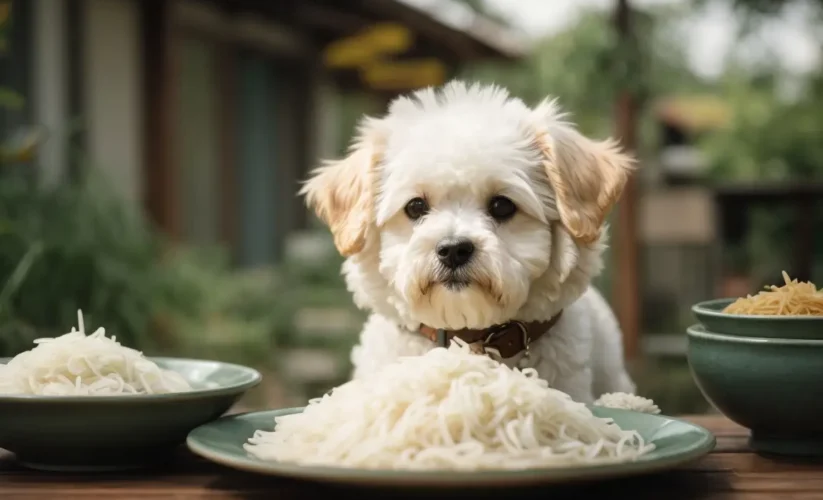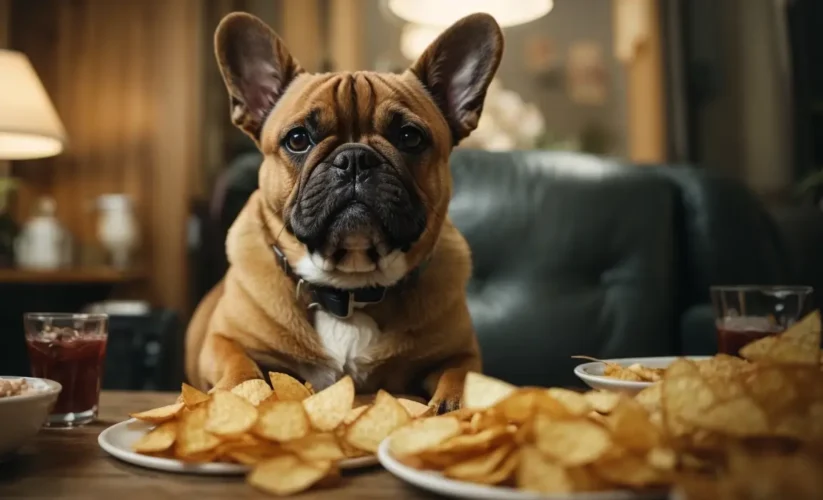Can dogs eat rice noodles?

As a seasoned dog blogger and a devoted dog owner, one of the most common queries I encounter is about the suitability of various human foods for our canine companions. Among these, a frequently asked question is: “Can dogs eat rice noodles?” This question is particularly relevant today, as our own dietary habits evolve and we increasingly consider sharing aspects of our diverse diets with our pets. Understanding what is safe and beneficial for them is not just a matter of curiosity but of utmost importance for their health and well-being.
The topic of feeding rice noodles to dogs is interesting because it sits at the intersection of nutritional science and pet care. Unlike traditional dog foods, rice noodles are a form of human food that doesn’t naturally fall into the canine diet. However, as pet owners, we often feel the urge to share our meals with our furry friends, making it essential to discern which foods are safe and which could potentially be harmful.
This article aims to provide a thorough exploration of whether rice noodles are a suitable addition to a dog’s diet. We’ll delve into the nutritional aspects of rice noodles, discussing their benefits and potential risks when fed to dogs. Additionally, this piece will contrast rice noodles with other types of noodles, broadening the scope of understanding regarding noodles in a dog’s diet.
The importance of this discussion lies in our responsibility as pet owners to ensure the health and happiness of our dogs. What we choose to feed them can have significant impacts on their health, behavior, and overall quality of life. Thus, through this article, we aim to equip dog owners with the knowledge necessary to make informed decisions about their pet’s diet, fostering a healthy lifestyle for their beloved companions.
Is Rice Noodles Good for Dogs?
Nutritional Profile of Rice Noodles
Rice noodles, a staple in many Asian cuisines, are primarily made from rice flour and water. Unlike some types of pasta, they are gluten-free, making them a potential alternative for dogs with gluten sensitivities or allergies. The primary component of rice noodles is carbohydrates, providing a quick source of energy. However, they lack significant amounts of protein, essential fats, vitamins, and minerals, which are crucial for a balanced canine diet.
Digestibility and Gastrointestinal Health
One of the advantages of rice noodles is their digestibility. Dogs typically find it easier to digest rice noodles compared to wheat-based products. This attribute makes them a suitable occasional treat, especially for dogs with sensitive stomachs or those prone to gastrointestinal upset. However, it’s important to serve them plain, without any sauces or spices that are commonly found in human dishes.
Allergy Considerations and Dietary Restrictions
For dogs with specific dietary restrictions or allergies, particularly to wheat or other grains, rice noodles offer a safe alternative. They do not contain gluten, a known allergen for some dogs. This characteristic makes rice noodles a viable option for owners looking to diversify their dog’s diet without risking an allergic reaction.
Impact on Weight and Overall Health
While rice noodles can be a safe treat in moderation, they should not constitute a significant portion of a dog’s diet. Their high carbohydrate content can contribute to weight gain and obesity if not balanced with exercise and a nutritious diet. Dogs, unlike humans, have different dietary requirements and do not need a high carbohydrate intake for their health. Overfeeding rice noodles can lead to an imbalance in their diet, potentially causing health issues like diabetes or obesity.
Appropriate Portion Size and Frequency
When introducing rice noodles to your dog’s diet, it’s important to start with small portions and observe how they react. A few bites of plain, cooked rice noodles can be a good start. They should not replace regular meals but can be used as an occasional treat. The frequency of feeding rice noodles should be limited, perhaps once a week or less, to prevent any negative health impacts.
Risks of Seasonings and Additives
A crucial point to consider is how rice noodles are prepared. In human cuisine, they are often served with various seasonings, oils, and additives that can be harmful to dogs. Ingredients like onion, garlic, excessive salt, and certain spices are toxic to dogs and should be strictly avoided. Always serve rice noodles plain and without any additional ingredients to ensure they are safe for canine consumption.
Nutritional Balance and Diet Integration
Integrating rice noodles into a dog’s diet requires a balanced approach. They should be seen as a treat rather than a dietary staple. Ensure that your dog’s diet remains rich in high-quality proteins, essential fats, and nutrients. Rice noodles can be a part of a diverse diet but should not detract from the nutritional completeness of their regular meals.
Professional Advice for Special Dietary Needs
Each dog is unique, and their dietary needs can vary greatly. Some dogs may have specific health conditions or dietary requirements that necessitate a specialized diet. In such cases, it’s always best to consult with a veterinarian or a canine nutritionist before introducing new foods like rice noodles. They can provide tailored advice based on your dog’s health status, breed, age, and activity level.
In summary, rice noodles can be a safe and digestible treat for dogs when served in moderation and plain. They are particularly useful for dogs with certain grain allergies. However, due to their high carbohydrate content and lack of essential nutrients, they should not be a regular part of a dog’s diet. Always prioritize a balanced diet and consult with professionals for dogs with special dietary needs to ensure the best health outcomes for your furry friend.
Is Rice Noodles Bad for Dogs?
Lack of Essential Nutrients
While rice noodles are not inherently harmful to dogs, their nutritional profile leaves much to be desired in the context of a canine diet. They are primarily composed of carbohydrates and lack essential nutrients that dogs require for a balanced diet. Dogs, being carnivores, have a biological need for proteins, essential fats, vitamins, and minerals. Rice noodles do not provide these in adequate amounts, making them a poor substitute for more nutritionally complete foods.
Risks of High Carbohydrate Diet
Dogs do not have a high requirement for carbohydrates in their diet. Feeding them foods high in carbs, like rice noodles, especially in large quantities, can lead to several health issues. The most prominent risk is obesity, as excessive carbohydrate intake can cause weight gain. Obesity in dogs can lead to other health complications such as diabetes, joint problems, and decreased life expectancy. It’s important to manage the portion size of carb-rich foods to maintain a healthy weight for your dog.
Digestive Issues and Allergies
In some dogs, a sudden introduction of rice noodles or overconsumption can lead to digestive issues like diarrhea or constipation. While rice noodles are generally easy to digest, every dog reacts differently, and some may have sensitivities to grains or specific food items. Additionally, although rare, some dogs might be allergic to rice or rice products, which could lead to adverse reactions like itching, gastrointestinal upset, or more severe allergic responses.
Toxic Ingredients in Prepared Dishes
Rice noodles are often prepared with various additives and seasonings in human cuisine. Ingredients such as onions, garlic, excessive salt, and certain spices are toxic to dogs and can cause serious health issues. Even small amounts of these ingredients can be harmful. Therefore, if rice noodles are to be given to dogs, they should always be served plain and in moderation.
Choking Hazard and Physical Harm
Depending on the preparation, rice noodles can pose a choking hazard, especially for smaller dogs or dogs that tend to eat quickly without properly chewing their food. Long strands of noodles can cause choking or gastrointestinal blockage if not adequately chewed. It’s crucial to cut the noodles into manageable pieces before offering them to your dog.
Alternatives to Rice Noodles
Given the limited nutritional value and potential risks associated with rice noodles, it may be beneficial to consider healthier alternatives. Foods that are more aligned with a dog’s dietary needs, such as lean meats, certain vegetables, and specially formulated dog foods, provide more balanced nutrition. These alternatives not only cater to the nutritional requirements of dogs but also minimize the risks associated with high-carbohydrate and non-nutritive foods.
The Verdict on Rice Noodles
In conclusion, while rice noodles are not toxic and can be consumed by dogs in small, infrequent amounts, they are not an ideal food choice. Their high carbohydrate content, lack of essential nutrients, and potential health risks outweigh the benefits. Dog owners should focus on providing a well-rounded diet that caters to the nutritional needs of their canine companions. As always, when in doubt or when dealing with dogs with specific health concerns, consulting a veterinarian is the best course of action.
Are Other Noodles Safe For Dogs?
Variety of Noodles in Canine Diets
When considering the inclusion of noodles in a dog’s diet, it’s important to remember that not all noodles are created equal. Different types of noodles have varying nutritional profiles and potential risks. Understanding these can help dog owners make safer choices for their pets.
Wheat Noodles: Pros and Cons
Wheat noodles, such as spaghetti or macaroni, are common in many households. While they are not toxic to dogs, they do pose similar concerns as rice noodles. They are high in carbohydrates and low in the essential nutrients dogs need. Moreover, for dogs with gluten sensitivity or wheat allergies, wheat noodles can cause digestive upset or allergic reactions. Therefore, if you choose to feed wheat noodles, it should be done in moderation and as an occasional treat.
Egg Noodles: Nutritional Considerations
Egg noodles, which contain eggs and wheat, offer a slightly higher protein content compared to rice noodles. However, they also contain carbohydrates and gluten, which means the same precautions apply. Additionally, their higher fat content, due to the eggs, should be considered, especially for dogs prone to obesity or with specific dietary restrictions. Serving egg noodles in small, infrequent portions is advisable.
Buckwheat Noodles: A Gluten-Free Option
Buckwheat noodles, often known as soba noodles, are a gluten-free alternative that can be safer for dogs with grain allergies. Despite their name, buckwheat is not a type of wheat but rather a seed, making it a suitable option for gluten-sensitive dogs. However, they still primarily provide carbohydrates and should be given sparingly and plain.
Safe Preparation and Serving
Regardless of the type of noodle, the safest way to serve them to dogs is plain, without any sauces, seasonings, or additives. Additionally, portion control is crucial. Noodles should only be a small part of a dog’s diet, primarily serving as an occasional treat rather than a staple food.
Conclusion on Noodles for Dogs
In summary, while various types of noodles like wheat, egg, and buckwheat noodles are not inherently dangerous for dogs, they do not offer significant nutritional benefits. Their high carbohydrate content and lack of essential nutrients make them a less ideal choice for a canine diet. Dog owners should prioritize high-quality, nutritionally complete dog foods and reserve noodles as an occasional treat. When introducing any new food, including noodles, it’s important to observe your dog for any adverse reactions and consult with a veterinarian for dogs with known health issues or dietary restrictions.
Final Thoughts
Feeding your dog rice noodles occasionally and in moderation is generally safe, but it should not replace their regular, balanced diet. Each dog’s dietary needs can vary, so it’s best to consult with a vet before introducing new foods. Remember, what works for one dog might not work for another. As responsible pet owners, our priority should always be the health and happiness of our furry companions.










